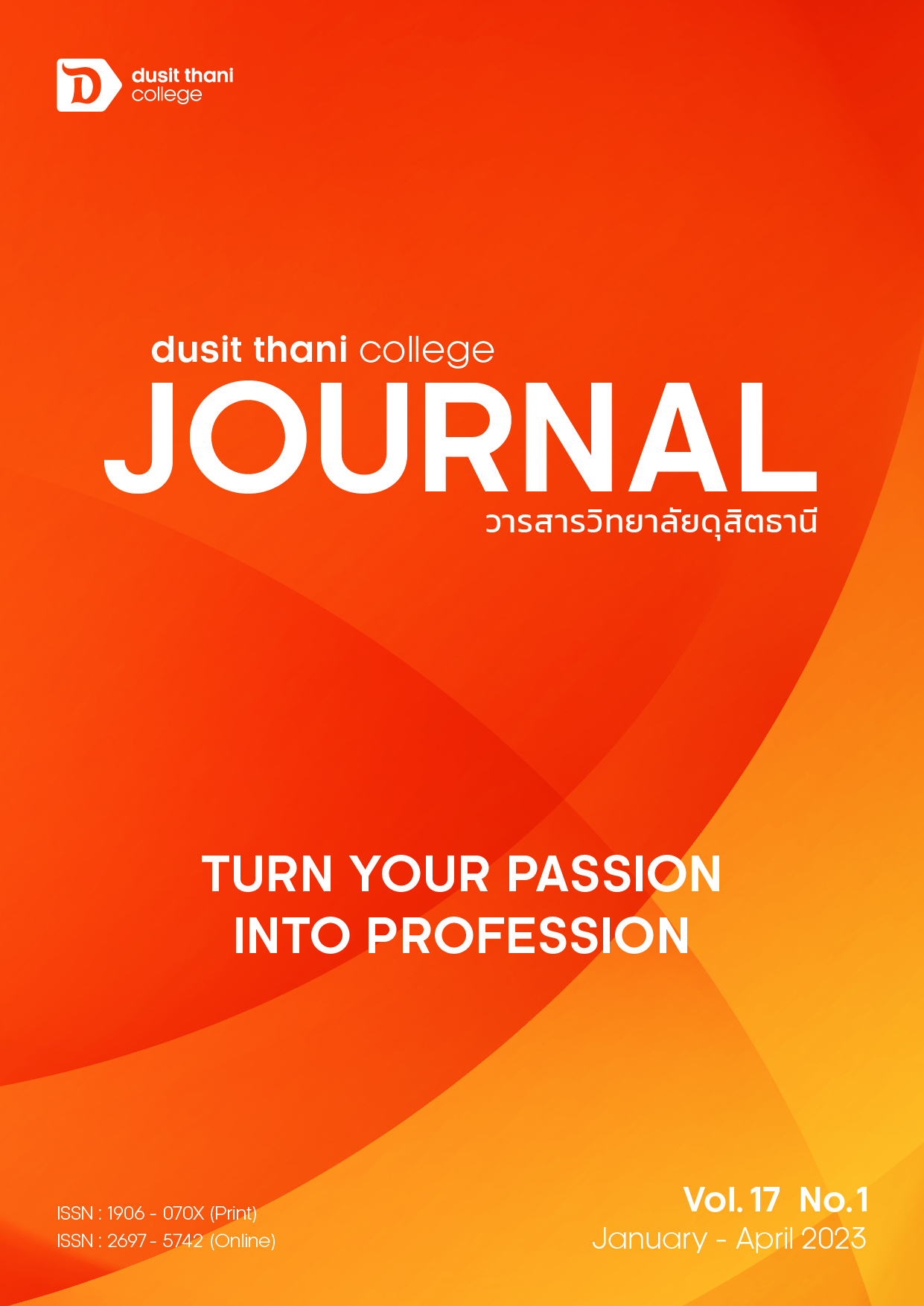ปัจจัยเชิงสาเหตุที่มีอิทธิพลต่อพฤติกรรมนักเรียนโรงเรียนสาธิตในกรุงเทพมหานคร
Main Article Content
บทคัดย่อ
การศึกษาปัจจัยเชิงสาเหตุที่มีอิทธิพลต่อพฤติกรรมนักเรียนโรงเรียนสาธิตในกรุงเทพมหานคร
มีวัตถุประสงค์เพื่อศึกษาระดับคุณลักษณะของผู้บริหาร คุณลักษณะของครู การมีส่วนร่วมของนักเรียนสิ่งแวดล้อมในโรงเรียน และพฤติกรรมนักเรียนโรงเรียนสาธิตในกรุงเทพมหานคร และเพื่อศึกษาปัจจัยเชิงสาเหตุที่มีอิทธิพลต่อพฤติกรรมนักเรียนโรงเรียนสาธิตในกรุงเทพมหานคร เป็นการวิจัยเชิงปริมาณ (Quantitative research) โดยใช้แบบสอบถามเป็นเครื่องมือในการวิจัย วิเคราะห์ข้อมูล ด้วยสถิติเชิงพรรณนา (Descriptive analytical statistics) หาค่าความถี่ ร้อยละ ค่าเฉลี่ย และค่าส่วนเบี่ยงเบนมาตรฐาน (S.D.) และแบบจำลองสมการโครงสร้าง ผลการศึกษาระดับพฤติกรรมนักเรียนโรงเรียนสาธิตในกรุงเทพมหานคร ประกอบด้วยตัวแปรจำนวน 5 ตัวแปร ประกอบด้วย คุณลักษณะของผู้บริหาร คุณลักษณะของครู การมีส่วนร่วมของนักเรียนสิ่งแวดล้อมในโรงเรียน และพฤติกรรมการเรียนรู้ จากผลการศึกษาในภาพรวมพบว่า อยู่ในระดับมากที่สุดทุกด้าน จากการศึกษาโมเดลความสัมพันธ์เชิงโครงสร้างของปัจจัยเชิงสาเหตุที่มีอิทธิพลต่อพฤติกรรมนักเรียนโรงเรียนสาธิตในกรุงเทพมหานคร พบว่าโมเดลมีความสอดคล้องกับข้อมูลเชิงประจักษ์ โดยมีพฤติกรรมการเรียนรู้เป็นผลลัพธ์สุดท้ายของโมเดล พบว่า ตัวแปรสิ่งแวดล้อมในโรงเรียนมีอิทธิพลทางตรงและอิทธิพลรวมที่ส่งผลต่อพฤติกรรมการเรียนรู้มากที่สุด รองลงมา คุณลักษณะของผู้บริหาร และการมีส่วนร่วมของนักเรียน
Article Details

อนุญาตภายใต้เงื่อนไข Creative Commons Attribution-NonCommercial-NoDerivatives 4.0 International License.
นโยบายการพิจารณากลั่นกรองบทความ
- บทความวิจัยและบทความวิชาการทุกเรื่องที่จะได้รับการตีพิมพ์ต้องผ่านการพิจารณากลั่นกรองโดยผู้ทรงคุณวุฒิ (Peer Review) ในสาขาที่เกี่ยวข้อง จำนวน 3 ท่าน/บทความ
- บทความ ข้อความ ภาพประกอบและตารางประกอบที่ลงตีพิมพ์ในวารสารเป็นความคิดเห็นส่วนตัวของผู้เขียน กองบรรณาธิการไม่จำเป็นต้องเห็นด้วยเสมอไป และไม่มีส่วนรับผิดชอบใด ๆ ถือเป็นความรับผิดชอบของผู้เขียนแต่เพียงผู้เดียว
- บทความที่จะได้รับการตีพิมพ์จะต้องไม่เคยตีพิมพ์ เผยแพร่ที่ใดมาก่อน และไม่อยู่ระหว่างการพิจารณาของวารสารฉบับอื่น หากตรวจสอบพบว่ามีการตีพิมพ์ซ้ำซ้อน ถือเป็นความรับผิดชอบของผู้เขียนแต่เพียงผู้เดียว
- บทความใดที่ผู้อ่านเห็นว่าได้มีการลอกเลียนหรือแอบอ้างโดยปราศจากการอ้างอิง หรือทำให้เข้าใจผิดว่าเป็นผลงานของผู้เขียน กรุณาแจ้งให้กองบรรณาธิการวารสารทราบจะเป็นพระคุณยิ่ง
เอกสารอ้างอิง
Best, J. W., & Kahn, J. V. (1993). Research in education. Boston: Allyn and Bacon.
Brandes, D., & Ginnis, P. (1992). The student-centred school. Herts: Simon and Schuster.
Buapong, P. & Chienwattanasook, K. (2021). Teachers Leadership and Work Environment That Influence the Effectiveness of Teachers Performance in Secondary School Level. Journal of Management Science Nakhon Pathom Rajabhat University, 8(1), 50-62.
Dharma, M. (2002). Student's satisfaction towards Burapha University's environment Sa Kaeo Information Campus. Master's Thesis, Burapha University.
Hair, J.F., Black, W.C., Babin, B.J. & Anderson, R.E. (2010). Multivariate Data Analysis. (7th ed.). Pearson: New York.
Holtzman, H. W. (1965). Survey of study habits and attitudes. New York: The Psychology Corporation.
Khamage, M. (2019). Environmental Influence of Contributing Learning for Development of Tertiary Students’. . Journal of Yanasangvorn Research Institute, 10(1), 192-200.
Ministry of Education. (2017). The National education plan B.E. 2560-2579 (2017-2036). Office of the Education Council, Ministry of Education.
Panich, V. (2012). Ways to create learning for students in the 21st. Bangkok : Sodsri-Saritwong Foundation.
Schumacker, R. E., & Lomax, R. G. (2010). A Beginner's Guide to Structural Equation Modeling (3rd ed.). New York, NY: Routledge.
Tongluea, S. & Boonsong, K. (2016). Characteristics and Administrative Behaviors of School Administrators Affecting Culture Quality of Schools under Phetchaburi Primary Educational Service Area Office 2. Veridian E-Journal, Silpakorn University, 9(3), 1055-1068.
Waewchan, N. (2017). Interior Architectural Student’s Learning Behavior: Case Study of the KMITL’s Interior Architecture Curriculum. Journal of the Faculty of Architecture King Mongkut's Institute of Technology Ladkrabang, 25(19), 107-123.
Weinstein, C. &Mayer, R. (1986). The Teaching of Learning Strategies. In: Wittrock, M., Ed., Handbook of Research on Teaching, Macmillan, New York, 315-327.
Yodsalee, C. & Boonsong, K. (2016). Factors Affecting Learning Achievement of Students in Schools under Prachuap Khiri Khan Primary Educational Service Area Office 2. Veridian E-Journal, Silpakorn University, 9(1), 1208-1221.


